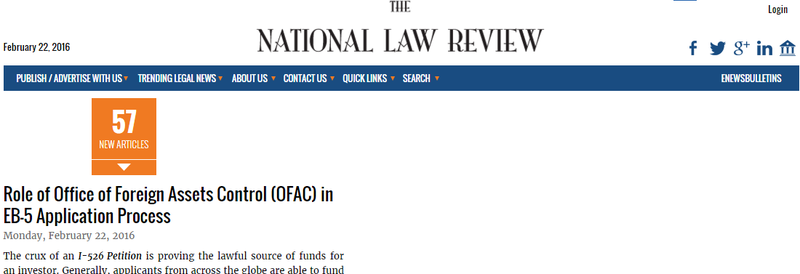Role of Office of Foreign Assets Control (OFAC) in EB-5 Application Process
The crux of an I-526 Petition is proving the lawful source of funds for an investor. Generally, applicants from across the globe are able to fund their investment via a wire transfer through their banking institution to the designated escrow account for the selected EB-5 project without incident. While escrow is not a legal requirement, it is the industry norm for most projects to establish one where funds are held for a certain period of time prior to deployment to the project.
However, nationals from certain countries, including Syria and Sudan, or investors who seek to utilize sanctioned institutions (e.g., Maulawi Ahmed Shah Hawala aka Roshan Money Exchange of Kandahar, Afghanistan) may find that they may not participate in the EB-5 program or have to obtain U.S. government pre-clearance in order to pursue the EB-5 investment. This post will discuss the U.S. Office of Foreign Assets Control (OFAC) and its role in the EB-5 immigrant investor visa process.
OFAC is under the purview of the U.S. Department of Treasury and is charged with administering trade and economic sanctions regimes. Certain OFAC sanctions regulations curtail the ability of certain investors from sourcing their funds and getting the funds into the U.S. This could be on the basis of the investor’s identity, nationality/citizenship, current country of residence, the financial institutions or third party individuals involved, or the entities involved in obtaining the investment funds. Generally speaking, if the investor is not subject to targeted sanctions and there are no imposed sanctions currently in effect for the investor’s country of residence or nationality, nor for the banking/financial institutions involved in the investment, OFAC has no explicit role in the EB-5 petition process. But what happens, say, when the investor is from and resides in a country that is currently sanctioned by U.S. law, such as Syria, where a lot of EB-5 interest exists given the political situation? A specific license from OFAC may be required.
OFAC administers two primary types of sanctions: country-specific sanctions and entity-specific (targeted) sanctions. The former addresses broader sanctions regimes imposed on a country or regional level; the latter consists of entities and individuals that are “owned or controlled by, or acting for or on behalf of, targeted countries,” but may or may not be operating from within those countries; it also includes entities, groups, and individuals specifically designated by the U.S. government. Currently, some of the countries subject to OFAC comprehensive sanctions include Syria, Sudan, and Iran. The prohibited and restricted lists administered by the U.S. government, as well as the country-specific sanctions regulations, should be checked when engaging in an analysis, as restrictions and rules vary on a case-by-case basis.
When a country or entity is blocked as a result of trade and economic sanctions, U.S. government authorization may be required, in the form of a license, to authorize the relevant activities that would otherwise be prohibited by standing trade sanctions. A wide variety of entities can find themselves the object of OFAC sanctions, including foreign governments, individuals, organizations/companies, and groups.
Applying for and obtaining a license from OFAC can be a time-consuming process, possibly taking longer than a year to issue. Because the lawful source of an EB-5 investor’s capital investment must be established at the time of filing the I-526 petition (i.e., “approvable when filed”), this license must be obtained before the investor funds his or her EB-5 investment. Therefore, this issue should be discussed with your immigration and international trade and customs counsel as soon as you engage them. The investor and his or her counsel should be proactive in identifying and addressing these issues because USCIS is undoubtedly aware of and looking out for them. If an OFAC violation were found to have occurred, the consequences could reach much further than a denial of the petitioner’s I-526 filing; rather, civil monetary and criminal penalties could also be imposed depending on the underlying facts. Thus, it is prudent to tackle any potential OFAC issues at the initial stages of the EB-5 process.
The need to involve OFAC in your EB-5 application process is not a death knell for the approvability of your case. If the underlying circumstances require that you obtain an OFAC license, there will be additional steps in your application process; however, this should not dissuade an otherwise qualified investor from considering participation in the program as these threshold issues can often be overcome with experienced counsel and adequate timing.
http://www.natlawreview.com/article/role-office-foreign-assets-control-ofac-eb-5-application-process
Mentions
States
- Pennsylvania
Securities Disclaimer
This website is for informational purposes only and does not constitute an offer or solicitation to sell shares or securities. Any such offer or solicitation will be made only by means of an investment's confidential Offering Memorandum and in accordance with the terms of all applicable securities and other laws. This website does not constitute or form part of, and should not be construed as, any offer for sale or subscription of, or any invitation to offer to buy or subscribe for, any securities, nor should it or any part of it form the basis of, or be relied on in any connection with, any contract or commitment whatsoever. EB5Projects.com LLC and its affiliates expressly disclaim any and all responsibility for any direct or consequential loss or damage of any kind whatsoever arising directly or indirectly from: (i) reliance on any information contained in the website, (ii) any error, omission or inaccuracy in any such information or (iii) any action resulting therefrom.




